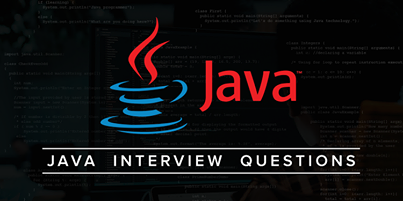Java has continued to show its importance in the software development industry for a long time now. If you wish to enter the field of software, it is not only important to learn and master java skills, but also to practice them. In this blog, we bring to you some of the commonly asked java interview questions for experienced professionals. These java interview questions will help you ace your interview process and push you closer to achieving your dream career. Let’s start learning!
Java Interview Questions for Experienced Professionals:
What do you mean by serialization in Java?
A process that is used to convert the state of an object into a byte stream is known as object serialization. This can be persisted into a file or sent over the network to any JVM or Java virtual Machine. If you follow the reversed process of the same, that is, creating an object from the byte stream, this is known as deserialization.
What do you understand by synchronization in Java?
A process in which handling resource accessibility by multiple thread requests is known as synchronization. One of the main reasons for following this process is to avoid thread interference. Suppose more than one thread is trying to access a shared resource, it needs to be ensured that this resource is used by one thread at a time. This is where synchronization comes into picture. By using the synchronization keyword in java, you can create a block of code that is known as the critical section.
Explain Spring in Java.
An application framework and inversion of control container is known as the spring framework. It’s main features can be utilized by any java application. However, there are certain extensions to build a web application on the Java enterprise edition or Java EE platform.
How do you create an immutable class in Java?
To create an immutable class in Java, you must follow these steps:
- Declare class as final. This is done so it can’t be extended.
- Ensure that all the fields are private. This is done so that no direct access is allowed.
- Do not allow setter methods for variables.
- Ensure that the mutable fields are final. This is done so that the value can be assigned only once.
- Initialize all the fields through a constructor.
- Perform cloning of the objects to return a copy instead of returning the actual object reference.
What do you mean by servlet in Java?
It is a language in java that is mainly used to expand the capabilities of servers who host applications by means of a request-response model. Servlets are more commonly used to extend the application hosted by the web server, but it can respond to any type of request. It defines HTTP-specific servlet classes.
Is it possible for static methods to reference non-static variables?
Yes! It is possible for static methods to reference non-static variables, and this is done by creating an object of the class that the variable belongs to.
If there are multiple static blocks, how do they get executed?
When there are multiple static blocks present, they are typically executed in the same sequence that they are written in. This is done in a top-down manner. First, the top block is executed. Then the other blocks follow.
Is it possible to override static methods?
No. It’s not possible to override static methods. This is because they are not dispatched to the object at the run time. A compiler decides which method gets called, and thus, a static method cannot be overridden.
What do you mean by a classloader?
As the name suggests, a classloader is a subsystem in a Java virtual machine which can be used to load a class file. In java, there are three built-in classloaders. Let us take a look at them.
- Bootstrap classloader: The bootstrap classloader is the first classloader that is a superclass of extension classloader. A rt.jar file is loaded, and it contains all the class files of a java standard edition such as java.net package class, java.util package class, java.lang, java.io, java.sql, and more.
- Extension classloader: A child classloader of a bootstrap and a parent classloader of the system classloader, extension classloader loads the jar files that are located within the $JAVA_HOME/jre/lib/ext directory.
- System or application classloader: A child of the extension classloader, system/application classloader works on loading the class files from the classpath which is by default set to the current directory. This can be changed by using the ‘-cp’ or ‘-classpath’ switch.
Is it possible to use string in a switch class?
String can be used in switch class as a syntactic sugar. A string hashcode is used internally for the switch.
What is the difference between checked and unchecked exceptions in Java?
It is mandatory for a method to handle the checked exception or to declare it as its throws clause. It must be checked by the compiler at compile time. These are a subclass of the exception but do not descend from the runtime exception.
An unchecked exception need not be compiled at compile time. It is a descendant of the runtime exception. You may find that this question is not asked too often these days by bigger firms such as investment banks or startups as compared to smaller companies.
Is the ++ Operation in Java thread-safe?
No. The ++ Operator in Java is not thread-safe. This is because it involves several instructions such as reading values, incriminating values and storing it back into the memory. This can cause an overlap between several threads.
Conclusion:
This brings us to the end of the blog on java interview questions for experienced professionals. We hope that you are now better equipped to attend interviews and were able to refresh your skills. These java interview questions are the ones that are commonly asked, and we hope that it helped you. Happy learning.
Please visit dajaba.net







